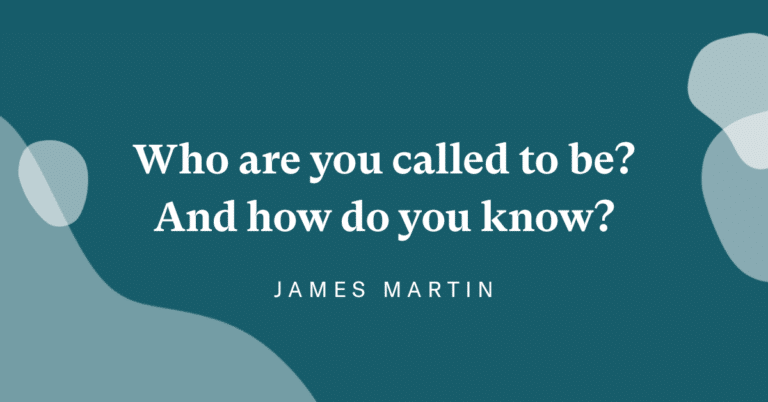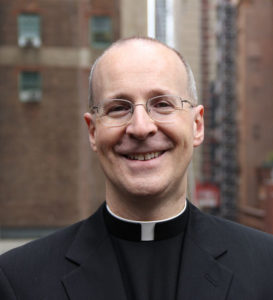James Martin
Who We’re Called to Become
Father James Martin is a beloved Jesuit writer and teacher who says desire is not selfish, but rather a path to understanding our callings in life. He believes everyone has a vocation we can find by asking: What moves me? “We all have an image of the person we want to become — more loving, more open, more free. That’s a call,” he says.

© All Rights Reserved.
Guest

James Martin is a Jesuit priest and editor at large of America magazine. His books include The Jesuit Guide to (Almost) Everything, Between Heaven and Mirth: Why Joy, Humor, and Laughter are at the Heart of the Spiritual Life, and, most recently, Building a Bridge.
Transcript
[music: “Sun Will Set” by Zoë Keating]
Krista Tippett, host: I’ve had hundreds of big conversations, and my conversation partners share wisdom I carry with me wherever I go. Father James Martin is a well-known and beloved Jesuit writer and teacher. He’s followed the calling of the founder of the Jesuit order, St. Ignatius of Loyola, to “find God in all things.” And he does so in 21st-century forms, including a wise and witty presence on Twitter, Facebook, and Instagram. But everyone, Fr. Martin says, has callings, a vocation. This is not something merely for monastics and clergy.
This is Becoming Wise. I’m Krista Tippett.
Ms. Tippett: I did not know the part of your story that — because you are known as a religious figure, I did not realize that you studied business in college and worked in corporate finance for GE into your mid-20s. And only then were captured, it seems, by Thomas Merton. And somewhere in one of your books, you pull out this first paragraph of No Man Is an Island. “Why do we spend our lives striving to be something that we would never want to be? If only we knew what we wanted. Why do we waste our time doing things which, if we only stopped to think about them, are just the opposite of what we were made for?”
Father James Martin: Yeah, that’s the line that changed my life, really, and I just thought, well, why? [laughs] Why am I doing that? And it felt like he was speaking directly to me. And I felt like, you know, business is a real vocation for a lot of people. And it just wasn’t for me. I was miserable. I didn’t know what I was doing. And I didn’t know how I could find a way out. And that sentence, which really was like a thunderbolt, prompted me to shake things up and ask myself that question. And I always say to young people, what would you want to do if you could do anything that you could do? It’s a very clarifying question for people. And, you know, Jesus asks people that. What do you want? Kind of understanding your desires. So, yeah, I love that paragraph. I go back to it a lot.
Ms. Tippett: I think something that really runs through all your writing is that callings and vocation, as opposed to a mere career, is not something that’s restricted to monastics.
Fr. Martin: Absolutely. Yeah, absolutely or priests or sisters or brothers. Everyone has a vocation. I mean, the most fundamental vocation is to become the person whom God created. And it’s both the person you already are and the person that God calls you to be. And I think we find that out through our desires. What moves us? What touches us? What are we drawn to? Part of that’s career. But only part of it. I mean, it’s really who you are called to be, and that’s why that question really spoke to me. A vocation is your deepest identity, and as well, being called to married life, or being a lawyer, or a teacher.
Ms. Tippett: Yeah. Being a parent, I think, is a vocation.
Fr. Martin: Absolutely. And you know, a much harder vocation than being a priest, frankly. We don’t get up at 3:00 in the morning for feedings.
Ms. Tippett: Well, you don’t get any of that training. You’re plunged into it.
Fr. Martin: No, we do not.
Ms. Tippett: I love the use of the word “desire,” because again I think if we do separate, if we do think about vocation or calling in narrow spiritual terms, which sounds very serious, then we probably wouldn’t use that language of desire — that is has to do with your desires and in fact being in touch with them is one kind of compass, but in fact there is a very long and deep philosophical and theological tradition of thinking about desire and calling.
Fr. Martin: Yeah. And you know, I’m a Jesuit, and our founder, St. Ignatius, in his classic text, The Spiritual Exercises, talked about praying for what you desire and also praying to understand your desires. Because I believe that your deepest desires, the things that you’re drawn to, the person you’re called to be, are really God’s desires for you. I mean, how else would God call us to something?
You know, you’d think of a married couple, that’s the easiest example. You know, they’re drawn to each other. It’s the same in different jobs. It’s the same in religious vocations. But it’s also the same in the person you desire to be. I think we all have an image of the person we want to become — more loving, more open, more free. That’s a call. It’s helping people understand that and recognizing it, that in a way that — to tell them it’s not selfish. Desire ultimately is not selfish.
Ms. Tippett: Yeah, it’s freeing and it opens the possibility that this not necessarily is easy, but is a process that has joy in it — and delight.
Fr. Martin: Yeah. And heartache sometimes, as we let go of the things that we’re not called to be and the parts of our lives that are keeping us back. This is God calling you, you know. This is a process. And it’s ultimately liberating, which is a great message for people.
[music: “Sun Will Set” by Zoë Keating]
Ms. Tippett: Father James Martin is editor-at-large of the Jesuit magazine America. His books include The Jesuit Guide to Almost Everything: A Spirituality for Real Life, and most recently, Building a Bridge.
Becoming Wise is produced by Marie Sambilay, Lily Percy, and Chris Heagle at On Being Studios, which is located on Dakota Land. And our theme music is provided and composed by Zoë Keating.
Books & Music
Recommended Reading
The On Being Project is an affiliate partner of Bookshop.org and Amazon.com. Any earnings we receive through these affiliate partnerships go into directly supporting The On Being Project.










Reflections